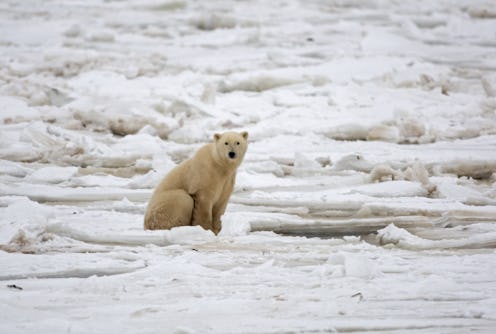News
The Ups & Downs Of Obama's ANWR Plan
President Obama made environmentalists very happy but Alaska politicians very ticked off on Sunday, when he announced a plan to set aside 12 million acres of the Arctic National Wildlife Refuge as wilderness, The Washington Post reported. The designation will offer the Arctic National Wildlife Refuge (ANWR) and 1.5 million acres of its coastal plain protection from drilling and other activity. The coastal plain area is believed to be rich in oil and gas reserves.
The plan was quickly denounced by Alaska lawmakers. Sen. Dan Sullivan told the Alaska Dispatch News that the move amounted to a "war on Alaska families," and said that it would "put Alaska and America’s energy security in serious jeopardy." But Secretary of the Interior Sally Jewell said in a statement on the department's website that the ANWR area holds significance "for America and its wildlife."
Just like Yosemite or the Grand Canyon, the Arctic National Wildlife Refuge is one of our nation’s crown jewels and we have an obligation to preserve this spectacular place for generations to come.
In a White House video describing the plan, the president called the ANWR an "incredible place."
It supports caribou and polar bears, all manner of marine life, countless species of birds and fish, and for centuries it supported many Alaska Native communities. But it’s very fragile.
Alaska politicians argue that at a time when the country's fiscal problems and dependence on foreign oil are creating both short-term and long-term issues, the U.S. might actually benefit from allowing oil exploration and production in untapped areas, many of which are federally protected. Alaska Gov. Bill Walker, an Independent, said Sunday in a statement that lower oil prices have had a significant impact on Alaska's economy.
Our fiscal challenges in both the short and long term would benefit significantly from increased oil production. This action by the federal government is a major setback toward reaching that goal.
Sen. Lisa Murkowski, chair of the Senate Energy and Natural Resources Committee, released a statement calling the plan a "stunning attack on our sovereignty and our ability to develop a strong economy." Murkowski added that Alaska would "fight back with every resource at our disposal." She took to Twitter to vent her anger:
According to the U.S Fish and Wildlife Reserve, President Eisenhower established the Arctic National Wildlife Refuge in 1960 “for the purpose of preserving unique wildlife, wilderness and recreational values.” The Fish and Wildlife Reserve says the area included in the proposed wilderness plan is home to polar bears, which are on the Endangered Species list, as well as caribou, grizzly bears, wolves, and musk oxen. Only Congress has the authority to designate wilderness areas, according to the Fish and Wildlife Reserve, but the president's plan will provide temporary protection for the ANWR. A large portion of the Arctic reserve already has "wilderness" status, under the 1980 Alaska National Interest Lands Conservation Act (ANILCA).
This is not the first time the two political parties have battled over the Arctic region in Alaska; far from it, The Washington Post points out. The fight over whether to preserve the area as pristine or drill for oil has raged for decades, even before a 2005 Congressional vote to allow drilling in the area.
President Obama has not shied away from putting forth legislation or proposals that he knows will be unpopular with Congress in the past few months. He's introduced a proposal to change the deportation rules for children of immigrants whose parents came to the U.S. illegally, announced a plan to increase taxes on the wealthy in his State of the Union address, and outlined a way to normalize U.S. relations with Cuba.
But the battle for the polar bears puts him in a whole other realm with Republicans determined to "drill, baby drill," in one of the last few pristine wildlife areas in the U.S. (The GOP, by the way, is claiming that such drilling and fracking activity is responsible for the current $2 per gallon gas prices, while at the same time Alaska lawmakers are saying how much those low prices hurt their state's economy).
It doesn't seem likely that a Republican-controlled Congress, with a senator as high-ranking as Murkowski, will allow this proposal to stand as it is for very long. But whatever the outcome in Alaska, it seems likely that the president is not only polishing his own legacy, but setting up some showdown issues with whoever succeeds him as the Democrats' nominee for president in 2016.
Images: Getty Images (1)
